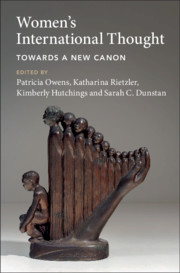Book contents
- Women’s International Thought: Towards a New Canon
- Women’s International Thought: Towards a New Canon
- Copyright page
- Contents
- Preface and Acknowledgments
- Introduction
- 1 Field and Discipline
- 2 Geopolitics and War
- 3 Imperialism
- 4 Anticolonialism
- 5 International Law and International Organization
- From The New State (1919)
- From A Monograph on Plebiscites (1920)
- From Must the League Fail? (1932)
- From “Socialism and Federation” (1941)
- From The Identity and Continuity of States in Public International Law (1954)
- From International Relations (co-written with Hugh B. Killough) (1956)
- From The Constitution and Government of Ghana (co-written with Leslie Rubin) (1961)
- From Refugees: A Problem of Our Time (1975)
- Mary Parker Follett
- Sarah Wambaugh
- Lucie A. Zimmern
- Barbara Wootton
- Krystyna Marek
- M. Margaret Ball
- Pauli Murray
- Louise W. Holborn
- 6 Diplomacy and Foreign Policy
- 7 World Peace
- 8 World Economy
- 9 Men, Women, and Gender
- 10 Public Opinion and Education
- 11 Population, Nation, Immigration
- 12 Technology, Progress, and Environment
- 13 Religion and Ethics
- Index
Mary Parker Follett
from 5 - International Law and International Organization
Published online by Cambridge University Press: 12 April 2022
- Women’s International Thought: Towards a New Canon
- Women’s International Thought: Towards a New Canon
- Copyright page
- Contents
- Preface and Acknowledgments
- Introduction
- 1 Field and Discipline
- 2 Geopolitics and War
- 3 Imperialism
- 4 Anticolonialism
- 5 International Law and International Organization
- From The New State (1919)
- From A Monograph on Plebiscites (1920)
- From Must the League Fail? (1932)
- From “Socialism and Federation” (1941)
- From The Identity and Continuity of States in Public International Law (1954)
- From International Relations (co-written with Hugh B. Killough) (1956)
- From The Constitution and Government of Ghana (co-written with Leslie Rubin) (1961)
- From Refugees: A Problem of Our Time (1975)
- Mary Parker Follett
- Sarah Wambaugh
- Lucie A. Zimmern
- Barbara Wootton
- Krystyna Marek
- M. Margaret Ball
- Pauli Murray
- Louise W. Holborn
- 6 Diplomacy and Foreign Policy
- 7 World Peace
- 8 World Economy
- 9 Men, Women, and Gender
- 10 Public Opinion and Education
- 11 Population, Nation, Immigration
- 12 Technology, Progress, and Environment
- 13 Religion and Ethics
- Index
Summary
The great lesson of the group process, in which all others are involved, is that particularism, however magnified, is no longer possible. There is no magic by which selfishness becomes patriotism the moment we can invoke the nation. The change must be this: as we see now that a nation cannot be healthy and virile if it is merely protecting the rights of its members, so we must see that we can have no sound condition of world affairs merely by the protection of each individual nation – that is the old theory of individual rights. Each nation must play its part in some larger whole. Nations have fought for national rights. These are as obsolete as the individual rights of the last century. What raises this war to a place never reached by any war before is that the Allies are not fighting for national rights. As long as history is read the contribution of America to the Great War will be told as America’s taking her stand squarely and responsibly on the position that national particularism was in 1917 dead.
- Type
- Chapter
- Information
- Women's International Thought: Towards a New Canon , pp. 257 - 260Publisher: Cambridge University PressPrint publication year: 2022



